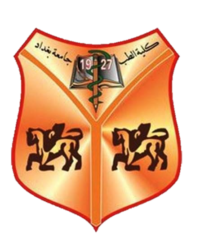Curriculum Description
This course description provides a necessary summary of the most important characteristics of the course and the expected learning outcomes for the student to achieve evidence of whether he made the most of the available learning opportunities. It must be linked to a description of the program.
General Description
- Name of Organization: Baghdad College of Medicine
- Department: Anatomy, Physiology, Biochemistry, Histology, Surgery, and Medicine Department
- Module Name: Endocrine and Reproductive Module
- Course Pattern: Large, Small Group, Laboratory Lectures
- Semester and Year: 2nd Year / Semester 2
- Total Course Hours: 54 theoretical hours and 3 practical hours
Goal of the Course
- Graduate safe and qualified doctors to provide primary health care and treat cases Emergency.
- Correct handling of daily forensic medical cases in hospitals.
- Focus on professional ethical aspects.
- Preparing medical students to deal with a list of daily medical cases in hospitals reproductive system.
- Describe the clinical findings and possible complications of infection in different age groups.
- Discuss treatment including general supportive measures and appropriate antibiotic regimens as well as study their side effects.
- Building and strengthening professional behavioral aspects.
- Schematics of the pathogenesis of pathogens and methods of spread.
Outcome of this Module
A. Cognitive and Theoretical Goals:
- To know enough information about the endocrine and reproductive system.
- To know different diseases, their causes, and diagnosis related to endocrine and reproductive from a clinical point of view.
- To reach the diagnosis through laboratories, serological, and radiological means.
- To give related drugs and know their side effects and interactions.
- To educate the community about the endocrine and reproductive system for their prevention.
B. Skills:
- Taking lab samples.
- Interpreting their results.
Methods of Learning
- Large and small group lectures, laboratories.
Methods of Assessment
- Formative assessment
- End semester exams
- Quizzes
- INLE website online exams.
- Final practical exam
- Summative Exam (written)
Values and Sentimental Goals
- To build good ethical skills and communication with the patients.
Infrastructure
- 11 weeks of 54 hours using the assessment and teaching methods mentioned above.
Resources
Course Books Required: Mentioned in the lectures.
Main References (Sources): Mentioned in the lectures.
Recommended Resources: WHO, CDC, MEDSCAPE
Electronic References: (YouTube, PubMed, Google Scholar)
Course Development Plan
- Through follow-up of updated resources.

